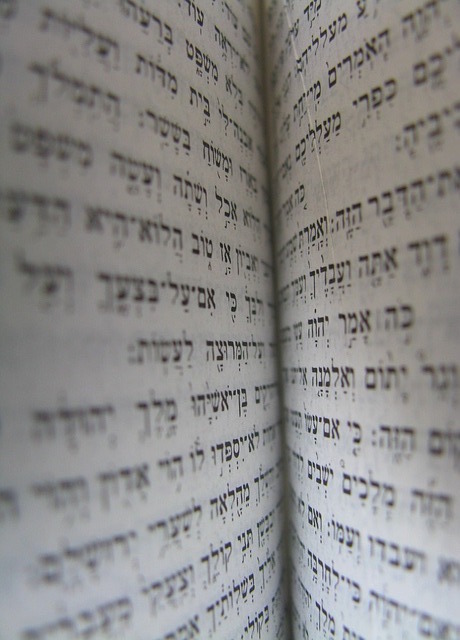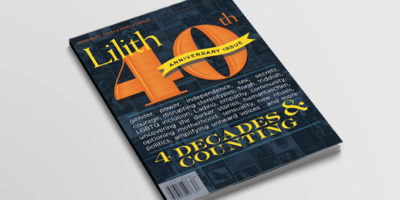
from “Torah as the Matrix for Feminism”
Cynthia Ozick’s startlingly original essay about Torah as the matrix for feminism: an entirely new way to see the links between feminism and Judaism. [Winter/Spring 1985]
What is feminism? Betty Friedan encapsulates it in a word—the “personhood,” she puts it, of women. On that everyone can agree, and it may be that we ought to stop at the definition that promotes agreement. But definitions that may promote disagreement are not without their importance. The revelation implicit in the study of Talmudic method is that, though not all analysis is equal because only one will carry the decision, all analysis is open to view. In that spirit, then, I want to offer a perhaps controversial definition of feminism—but not before taking a Biblical look at an instance of “personhood….”
Consider, by way of illustration, Hannah, the mother of Samuel: a heroine of Jewish civilization. She is counted as a heroine because she was a barren woman who prayed to have a child and got one. Now a hard case can be made that none of this is exceptionally heroic, however exceptional the child turned out to be. What it is, in fact, is a story of conformity in an age not very different from our own, an age when woman’s personhood is defined by her ability to be the mother of a son. Hannah in her story is a woman of conventional expectation —she wants to have her dignity, and the only way under patriarchy she can aspire to it is through achieving mother- hood. Without motherhood she has no personhood—she is nothing. And she is, accordingly, treated as nothing.
She goes up to the House of the Lord and speaks a prayer “in her heart; only her lips moved, but her voice was not heard”—so immediately, of course, Eli, the man in charge of the House of the Lord, thinks she’s a bag lady, a drunk, and advises her to “put away the wine from thee.” Well, she certainly looks like a drunk, muttering away to herself like that—no woman, after all, is expected to own a spiritual dimension.
…Hannah is a heroine of religious civilization because she invents, out of her own urgent imagining, inward prayer. Without bringing a sacrifice, without requiring priestly attendance, soaring past every liturgical convention, she rides her words up into the holy air of the House of the Lord; and in that instant she alters forever what we mean by “prayer.” Hannah is an originator, a genius of envisioning: she imagines a Lord of History who not only can command event, but who can also listen to a still, small voice; she imagines the power of that still, small voice itself to influence event. On a lesser plane, one might say that she is the inventor of the inward force of psychology.
But the content of this inward force is less innovative. Hannah, genius of lyric outcry though she is, originator of prayer-speech though she is, is nevertheless perfectly conventional in her most pressing desire: she wants to do exactly what society expects her to do. She prays to have a son; she prays to own prestige through motherhood. The inventor of prayer is, simultaneous with her genius, a woman obedient to the rules of patriarchy.
Hannah is the first we would take for a religious heroine. She is the last we would take for a feminist heroine. Hannah’s gift is incandescent; but there is nothing feminist in her story.
Until we have a look at her husband, Elkanah. He, after all, is living in the same patriarchal society. He has another wife, Peninah, who does bear children, and no doubt Hannah is jealous of Peninah because Hannah, in common with her society, cannot conceive of personhood without motherhood. Not so Elkanah. “Hannah,” says Elkanah, “lameh tivki? Why weepest thou? And why eatest thou not? And why is thy heart grieved? Am I not better to thee than ten sons?” Now nothing is more valuable in the world of Hannah and Elkanah than a son, and ten sons ten times that—so that in asserting the value of his individual personhood to Hannah, Elkanah is also asserting the value of Hannah’s individual personhood to himself, even without the achievement of motherhood. Hannah has value even if she cannot be the instrument of generation.
It is a tremendous metaphysical moment, the earliest declaration of intrinsicness, a new idea of woman, an unconventional idea, a radical idea—metaphysical in the transcendent sense, and also in its non-attachment to physicality. Hannah, cries Elkanah, with or without sons you have value in yourself! What Elkanah—a feminist hero found in the first paragraphs of the First Book of Samuel—has discovered in himself is the first principle of feminism: the ethical passion that expresses itself against instrumentality, against woman-as-instrument, against woman-as- the-instrument-of-societal-policy.
…And this is where I want to offer a view of feminism that is not entirely in consonance with the views of many self-designated feminists today. I want to affirm what I have been repeatedly told is an “old- fashioned,” an obsolete, idea of feminism. I think of it, however, as classical feminism, and consider that departures from classical feminism have been departures from feminism itself. I speak of the idea of feminism as the transcendence of biology. Now we have heard it said again and again in the current mode of corporeal feminism that “biology is a factor.” Yes, biology is a factor. How can it not be a factor? Each of us is a kettle of organs; the brain, the seat of human thought, is a mere organ; we are all biological creatures; we are organisms.
But the urgency of classical feminism, which many have forgotten, or ignore, or dissent from, or believe we have evolved from, was precisely the fight against the notion that anatomy is destiny. If anatomy is destiny, then every woman, and every man, is by definition an instrument of blind biology, and the human being no longer lives in the aspiring Kingdom of Ends, but wholly and savagely in the Kingdom of Instrumentality”


